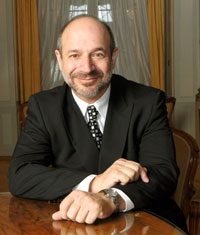 DR. BRUCE A. BEUTLER AWARDED WILL ROGERS ANNUAL PRIZE FOR RESEARCH
DR. BRUCE A. BEUTLER AWARDED WILL ROGERS ANNUAL PRIZE FOR RESEARCH
The Will Rogers Institute’s annual prize for outstanding contributions to lung research has been awarded to Dr. Bruce A. Beutler. He is the third recipient of the prestigious $50,000 prize from the Will Rogers Institute.
Bruce A. Beutler, M.D., is the chairman of the Department of Genetics at the Scripps Research Institute in La Jolla, CA. He is an immunologist and geneticist, and he is considered among the best in his field.
Dr. Beutler has made fundamental discoveries about the molecular basis of innate immunity and inflammation. Innate immunity encompasses the various common mechanisms by which humans, animals and plants defend themselves against infections. Inflammation is the side effect of this defense. Innate immunity and inflammation are intimately involved in defending against lung infections, or pneumonias, including those due to bacteria (e.g., pneumococcus), viruses (e.g., influenza) and fungi (e.g., Valley fever due to coccidioidomycosis). Sepsis, total body inflammation in its most severe form, is life threatening.
Dr. Beutler’s work in the 1980s showed that the production of a protein called “tumor necrosis factor” or “TNF” is greatly increased early during infection and that this substance is responsible for the symptoms and signs of infection, including the signs of sepsis. In the 1990s, he researched the cause of the increased production of TNF and showed that its production is regulated by a molecular “fire alarm,” a detector of bacteria called the toll-like receptor 4 (TLR4). TLR4 detects endotoxin, a coating material on many types of bacteria (including those that infect the lung) such as E. coli, Salmonella and Y. pestis (the bacteria that cause bubonic plague). Endotoxin can stimulate inflammation and sepsis even when the bacteria are killed by our defenses or by antibiotics. In the 2000s, Dr. Beutler’s laboratory worked out the pathways by which TLR4 and other TLRs regulate inflammation and host defense. Dr. Beutler’s work has answered some of the oldest and most basic questions in medicine: why infections (including pneumonias) with different microbes give rise to often similar illnesses with fever and malaise, what causes sepsis, and why sepsis is life threatening even if the infectious microbes are killed by our defenses or by antibiotics.
Dr. Beutler received his undergraduate degree from University of California San Diego, and his M.D. from the University of Chicago. He did his residency at the University of Texas Southwestern Medical Center. Dr. Beutler has received many awards and accolades throughout his career, such as the Albany medical Center Prize in 2009, Frederik B. Bang Award in 2007, among others. He has co-authored more than 300 papers that have been cited over 38,000 times by other scientists.